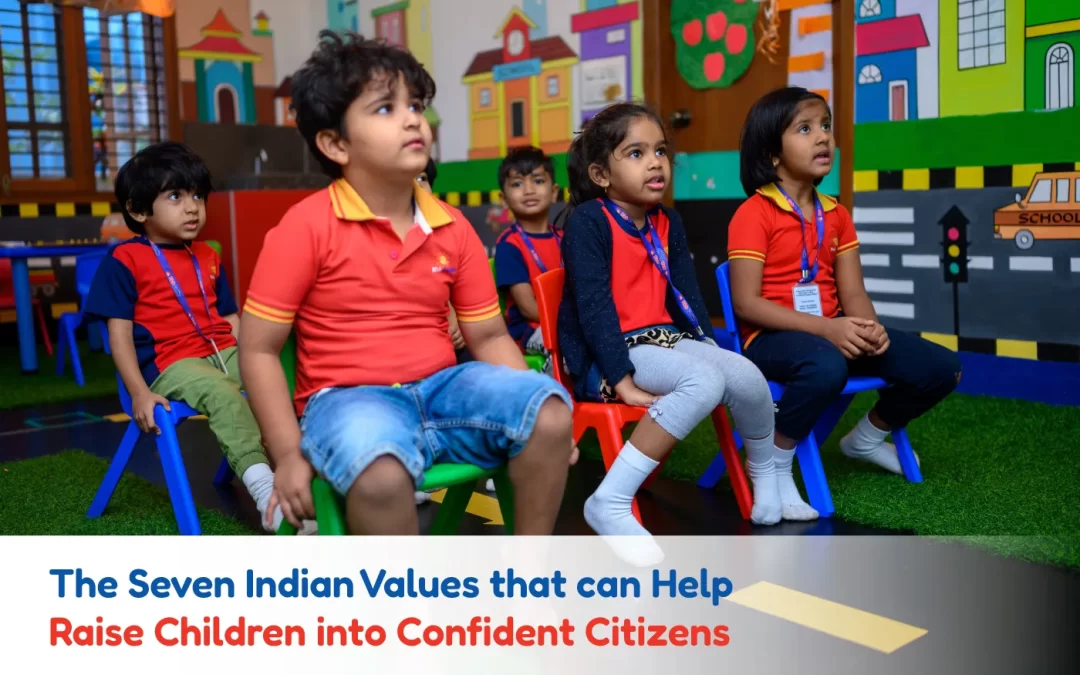In this rapidly changing world, the impact of globalization, technology, and modern practices has changed. Preschooler’s development and learning have been complex. Despite these changes, Indian values are essential for cultivating a strong sense of individuality, accountability, and respect.
By embracing these timeless principles, parents of children, particularly those in preschool, can significantly impact the development of the future generation.
Now let’s see what exactly are some of the Indian Values parents inculcate in their children:
Indian Values Parenting for Kids
Preschoolers raised with Indian principles are taught to respect elders, love their families, and be kind to others. Their parents encourage children to be hardworking, patient, and disciplined. In addition, they emphasize the meaning of humanity, thankfulness, and lending a hand to those in need. Introducing religion and cultural customs helps build a solid sense of personality.
Overall, preschoolers benefit from these qualities because they help them develop into kind, responsible, and civilized adults. In this blog we will discuss the seven Indian values that may help shape your child’s personality.
Respect For Elders and Authority
Respect for elders is one of the fundamental principles that Indian culture strongly emphasizes. The basic concept of Indian parenting is respect for authority, which extends from parents and educators to other senior community members.
Bowing down or touching the feet of the elders is a gesture of respect practiced in most families.
Parents can assist their children in developing these values by setting a good example.
Strong Family Bonds
In Indian culture, the family is the foundation for emotional support and guidance. Children are taught the importance of maintaining strong family relationships early, from respecting parents to understanding their responsibilities toward siblings.
As parents, it is crucial to prioritize family time, teach cooperation, and emphasize the values of caring for one another. This will help children grow up with a sense of love, trust, and belonging. Additionally, with a solid understanding of family dynamics, children can learn to appreciate unity in diversity, another fundamental Indian value.
Diversity and Unity
India’s multiple languages, customs, traditions, and faiths are widely celebrated. Teaching kids to accept differences while discovering areas for agreement is a priceless lesson that prepares them to live peacefully in a multicultural society.
By celebrating different festivals and exposing their kids to other cultures, parents help them appreciate the beauty of diversity. Diversity promotes equality, tolerance, and acceptance—elements that are crucial in today’s globalized society.
Social and Community Responsibility
Likewise, Indian culture recognizes the value of social responsibility and community service. Children learn about giving back to society early on through volunteering, charitable contributions, or even simple acts of kindness towards animals.
As a result, they develop a sense of responsibility and a drive to make constructive contributions to their community. Children can be taken to social or religious gatherings to cultivate social harmony and help others.
Spiritual and cultural awareness
Spiritual principles and cultural understanding are essential to Indian life. Parents introduce young children to India’s spiritual and cultural history using stories from the scriptures, epics, or regional customs.
As a result, children gain a strong sense of morality and thankfulness. Yoga, meditation, and chanting can teach children the value of inner calm, mindfulness, and self-discipline.
Education as a Priority
Education is deeply valued among Indian parents, seen as the key to success, financial stability, and family pride. From an early age, parents encourage academic excellence through structured routines, private tutoring, and motivational stories of perseverance.
They celebrate achievements while setting clear expectations for continuous improvement, often offering rewards for good performance and using discipline when necessary. Many integrate spiritual practices, such as prayers before exams, to inspire confidence and focus.
Strong Work Ethic and Discipline
A strong work ethic is built in Indian children from an early age, usually through home tasks or an emphasis on academics. Parents have an important role in teaching children the importance of hard work, responsibility, and discipline.
They help youngsters develop strength, attention, and dedication by setting clear expectations and being role models. This foundation drives academic success and develops students into people who see the value of commitment, consistency, and accountability in all aspects of life.
Conclusion
Incorporating Indian principles into parenting creates well-rounded, responsible, and empathetic children. By combining tradition and modernity, parents may ensure that their children grow up to be successful, understanding citizens who contribute constructively to society. These timeless ideals will help them live a life of honesty and character.
At Kids Castle Pre School, we believe in encouraging these fundamental principles in future leaders who will succeed academically and develop into respected and caring persons.
Join us in building a foundation for your child’s success! Visit Kids Castle Preschool to discover more about how we incorporate these ideals throughout early education.

